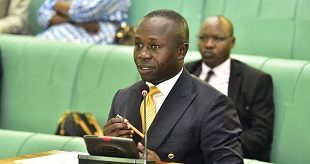
Kampala, Uganda | THE INDEPENDENT | The International Monetary Fund, IMF, has approved the immediate disbursement of 240 million dollars (886 billion Shillings) under the Extended Credit Facility (ECF) arrangement. This follows the approval of the combined second and third reviews of Uganda’s performance under the arrangement, and this brings the total agreed disbursement so far to 625 million dollars (2.307 trillion Shillings).
The ECF is a relief arrangement by the IMF for member countries with widespread or prolonged balance of payments problems, especially following the impact of the Covid-19 pandemic on low-income and developing economies. In December last year, the IMF staff mission to Uganda said they had reached an agreement with the government authorities on a conclusion of the reviews but that the final decision on the release of the tranche depended on the approval of the board.
The ECF arrangement for Uganda for a total of about 1 billion dollars (about 3.7 trillion shillings) was approved by the Executive Board on June 28, 2021, aiming to support the near-term response to the COVID-19 pandemic and boost more inclusive private sector-led long-term growth. It comes with conditions for the country to make some specified financial management reforms. Reforms focus on creating fiscal space for priority social spending, preserving debt sustainability, strengthening governance, and enhancing the monetary and financial sector frameworks.
“The Ugandan authorities have managed to preserve macroeconomic stability while sustaining the post-COVID-19 recovery despite rising pressure from global shocks and successive domestic shocks, including new public health challenges,” says Bo Li, Deputy Managing Director at IMF.
He notes that Uganda’s economy is projected to grow by 5.3 percent in the financial year 2022/2023, which is lower than the 6 percent that had been projected during the first review in March last year. The forecast also shows higher inflation rates compared to those recorded 10 months ago, with the IMF saying that these revisions reflect the impact of the war in Ukraine, tighter external financial conditions, drought, and rising domestic borrowing costs.
Even this outlook remains at risk from higher imported inflation, lower external demand, climate change, and public health outlook in view of the threats of new outbreaks. The IMF advises that tight macro policies and continued exchange rate flexibility will help strengthen the economy against external shocks.
In spite of all these effects, the IMF board is convinced that the country performed well in almost all the required reforms. “Notwithstanding the challenging environment and a heavy reform agenda, all but one quantitative performance criteria and most indicative targets for March, June, and September 2022 were met and the authorities have taken important steps to advance structural reforms,” the statement says.
The reforms cited include the steps taken to strengthen the governance and anticorruption frameworks by amending the regulations to include the beneficial ownership aspect in wealth declaration. Others publish information on compliance with the Leadership Code Act and on applications to access the declarations and amending the law to establish a central registry for beneficial ownership information of legal entities.
There are also forthcoming regulations expected to allow timely access to the beneficial ownership registry. The IMF also hails the adoption of the tax expenditure rationalization plan which it hopes, will jump-start efforts to streamline the system and mobilize tax revenue in an efficient and equitable way.
The tax expenditure rationalisation plan aims at, among others streamlining the tax incentive regime for investors. It involves criteria for choosing beneficiaries, the purpose of the tax incentive, time frame and clauses indicating obligations of investors who intend to benefit, and the nature and number of jobs expected to be created.
“Enhanced domestic revenue mobilization, including via the elimination of inefficient tax exemptions, rationalization of non-priority spending, and shifting the composition of spending towards priority social areas will help achieve the fiscal objectives and address large development needs. The introduction of the Parish Development Model was a welcome development,” says Li’s statement.
He also hails the banking system that he says is well-capitalized, adding that financial stability risks should continue to be minimized. He, however, says that accelerating the momentum of structural reforms is essential to help move Uganda towards attaining its goal of middle-income status.
“Priorities include enhancing domestic revenue mobilization, strengthening governance, transparency, the anti-corruption framework, and the AML/CFT regime, advancing the financial inclusion agenda, and climate adaptation measures.”
*****
URN
 The Independent Uganda: You get the Truth we Pay the Price
The Independent Uganda: You get the Truth we Pay the Price


